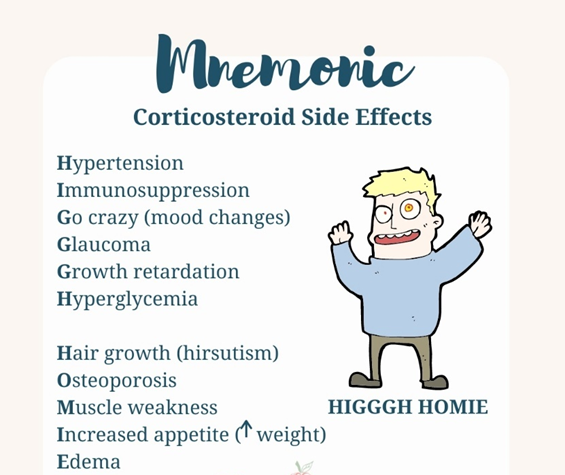A nurse is planning care for a client who has multiple sclerosis and is receiving methylprednisolone. Which of the following adverse effects should the nurse anticipate? (Select all that apply.)
Bladder spasms
Hypotension
Delayed wound healing
Hirsutism
Hyperglycemia
Correct Answer : C,D,E
Choice A Reason:
Bladder spasms are not commonly reported as adverse effects of methylprednisolone. However, bladder dysfunction can occur in individuals with multiple sclerosis due to the disease process itself, but it is not specifically related to corticosteroid therapy.
Choice B Reason:
Hypotension is not a common adverse effect of methylprednisolone. In fact, corticosteroids can often lead to fluid retention and sodium retention, which can contribute to hypertension rather than hypotension.
Choice C Reason:
Delayed wound healing is correct. Corticosteroids can impair the body's ability to heal wounds by suppressing the inflammatory response and collagen synthesis. Therefore, clients receiving methylprednisolone may experience delayed wound healing, which can be problematic, especially in individuals with pre-existing wounds or undergoing surgical procedures.
Choice D Reason:
Hirsutism (excessive hair growth, especially in women) can occur with long-term corticosteroid use due to the effect of steroids on hair follicles. It is a possible adverse effect of methylprednisolone.
Choice E Reason:
Hyperglycemia is correct. Corticosteroids can increase blood glucose levels by promoting gluconeogenesis, reducing glucose uptake by tissues, and inducing insulin resistance. Clients receiving methylprednisolone may develop hyperglycemia, which can be particularly concerning for individuals with diabetes or those at risk of developing diabetes.

Nursing Test Bank
Naxlex Comprehensive Predictor Exams
Related Questions
Correct Answer is B
Explanation
Choice A Reason:
Higher oxygen saturations of 98% to 99% is inappropriate. A pneumothorax involves the presence of air in the pleural space, which can compromise lung function and gas exchange. This compromised lung function typically leads to decreased oxygenation of the blood, resulting in lower oxygen saturations rather than higher saturations.
Choice B Reason:
Lower oxygen saturations of 93% to 94% is appropriate. A pneumothorax disrupts the normal exchange of oxygen and carbon dioxide in the lungs due to partial or complete lung collapse. As a result, the affected lung is unable to adequately oxygenate the blood, leading to lower oxygen saturations, which are indicative of hypoxemia.
Choice C Reason:
Lower energy expenditure is inappropriate. Energy expenditure is not typically affected by a pneumothorax. While the discomfort and respiratory distress associated with a pneumothorax may cause the individual to limit physical activity, there is no direct impact on overall energy expenditure.
Choice D Reason:
Increased lung capacity is inappropriate. A pneumothorax results in partial or complete collapse of the affected lung, reducing lung capacity rather than increasing it. The presence of air in the pleural space creates positive pressure, which can compress the lung and decrease its ability to expand fully during inhalation.
Correct Answer is A
Explanation
Choice A Reason:
MS hug is appropriate. The "MS hug" is a colloquial term used to describe a sensation of tightness, pressure, or squeezing around the torso or chest area experienced by some individuals with multiple sclerosis (MS). It is caused by spasms or contractions of the intercostal muscles (muscles between the ribs) or the diaphragm due to lesions in the spinal cord disrupting nerve signals. This sensation can be uncomfortable or painful for the individual.
Choice B Reason:
Lhermitte's sign is inappropriate. Lhermitte's sign is a common symptom experienced by individuals with MS but it presents differently. It is characterized by an electric shock-like sensation that radiates down the spine and into the limbs, typically triggered by flexing the neck forward. It is caused by damage to the spinal cord's myelin sheath, leading to abnormal nerve signal transmission.
Choice C Reason:
Paroxysmal spasms is inappropriate. Paroxysmal spasms are sudden, involuntary muscle contractions or jerking movements that can occur in various parts of the body. While spasms are common in MS, they are not specifically associated with the sensation of tightness around the torso as described in the scenario.
Choice D Reason:
Trigeminal neuralgia is inappropriate. Trigeminal neuralgia is a condition characterized by sudden, severe facial pain often described as stabbing or electric shock-like. It is caused by irritation or damage to the trigeminal nerve, which is responsible for facial sensation. While individuals with MS may experience trigeminal neuralgia, it typically does not present with a tightening feeling around the torso.
Whether you are a student looking to ace your exams or a practicing nurse seeking to enhance your expertise , our nursing education contents will empower you with the confidence and competence to make a difference in the lives of patients and become a respected leader in the healthcare field.
Visit Naxlex, invest in your future and unlock endless possibilities with our unparalleled nursing education contents today
Report Wrong Answer on the Current Question
Do you disagree with the answer? If yes, what is your expected answer? Explain.
Kindly be descriptive with the issue you are facing.
